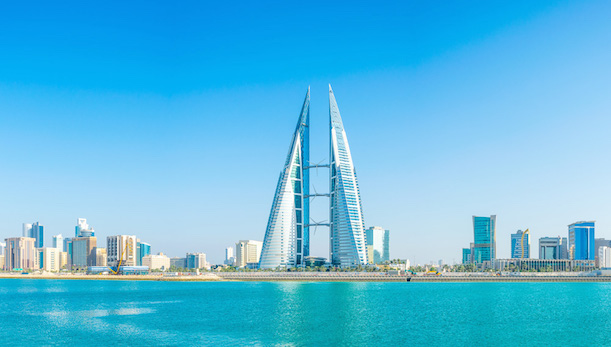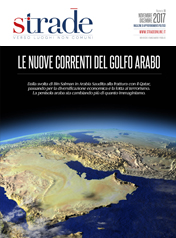Generating strength through unity: the example of Bahrain
Novembre/Dicembre 2017 / Monografica
Bahrain is a small country but at the same time it has a multiethnic, multicultural and multireligious society - a peculiarity that makes it an exceptional laboratory for the reforms that are taking place in the entire Arab Gulf region.

Bahrain is a small island state, a multiethnic, multicultural and multireligious Kingdom in the Arabian Gulf. The foreign affairs of Bahrain and the security provisions it has prioritised reflect the geopolitical and geo-economic realities it faces. 2017 — despite the turbulence in the wider Middle East and, specifically, in the Arab Gulf — has not altered Bahrain’s strategic thinking. Instead, it has reinforced it. The events of 2017 have justified the path that Bahrain has been following especially as we have had to steer a course that confronts two terrorist threats, a looming geopolitical rival, shifting regional alliances, risks of war spilling over from Yemen, Iraq, and Syria while ensuring that our citizens are safe, secure, healthy, prosperous and free so that Bahrain can continue to contribute to the international community.
2017, however, has been a year of turmoil. And whether talking about the host of strategic or unfolding socio-economic and environmental challenges, it is likely that global affairs will remain in a state of fluctuation and crises well into the future. As a small island state, Bahrain feels the pinch of these challenges more acutely than others—we lack the strategic depth to cushion ourselves from rising waters, the tides of sectarianism or any number of other threats. Bahrain simply must act fast, develop and deploy strategies that reflect the size of the country vis-a-vis the urgency of the challenge.
The past year reinforced the idea that security is not only a matter of military affairs but is a wider concept that encompasses sustainable development, gender equality, youth empowerment, economic opportunities and stability, environmental awareness, a durable civil society, healthcare and education. In cases where these elements are lacking, security and stability remain elusive. Travel to Syria or Iraq or Libya and investigate the origins of state failure and national vulnerability and, in addition to external factors, clear gaps in societal security glare back. This is why Bahrain — among other Arab Gulf countries — remains committed to reform and development. It is a part of our heritage and the true guarantee of internal security.
Despite the 1979 Iranian revolution, which has been a main factor in the instability of the region ever since — including in 2017 — and the continued Iranian policy to export its revolution (to Bahrain) Bahrain has persevered and we are proud to be a nation of diverse religious groups, a nation of peaceful coexistence that has only strengthened over the years and centuries. Bahrain is predominately a combination of Muslims from Arab nations but you will also find Christians, Jews, Hindus, all of whom are nationals of Bahrain living peacefully in the country, contributing to the development of the country. This is a successful model at a time when religious intolerance has caused chaos in the region. It has, however, not been easy. With a neighbour like Iran channelling its resources into destroying our model and focusing its attention on the division of our society, Bahrain has suffered and such interference poses one of the most potent challenges we have faced over the decades, a challenge that continues to imperil our citizens.
Bahrain responded as it always has, by doubling its efforts to maintain social cohesion. The most recent drive commenced in 2000 when His Majesty, King Hamad Bin Isa Al Khalifa, introduced his reform project which is, in fact, a continuous, inclusive, political, social and economic project that introduced a number of initiatives in the country which continue to unfold today.
Consider that only 17 years ago Bahrain did not yet have an elected Parliament. There was a single chamber which was appointed directly. Next year Bahrain will head to the polls to elect its 5th, four-year mandated parliament. 17 years ago women did not have full rights and now they are on par with men. Furthermore, the 2017 Family Law provides important legal provisions that hoist Bahrain to among the most advanced societies around the world. 17 years ago we had not yet adopted the separation of powers that we now boast. We focus on economic and social development and gender equality so that men and women are equal in both duty and in terms of rights. Today we are all proud to find women sitting side by side with men in every field imaginable, whether you think of lawyers, prosecutors, judges, ambassadors, ministers, soldiers, artists, or national sportsmen. The gender gap has closed and Bahrain is a stronger country as a result.
Shifting to Bahrain’s foreign policy, there are a number of fundamental pillars that we have always prioritised and 2017 saw their continuation. Respect for our country’s sovereignty, non-interference in other states, peaceful coexistence with others, support for all international efforts that bring peace and prosperity on a global scale. This is why Bahrain is a major actor in the international fight against terrorism. A collective approach is necessary to address that and Bahrain genuinely believes in multilateralism.
Terrorism is truly among the most pronounced threats facing the world today, but terrorism cannot function without financing. It can function without territory, it can function without a clear command and control structure but it cannot function without finances. So where does terrorist finance come from? A collective approach to combating terrorism and combating the financing of terrorism is a priority. Bahrain is leading the way in interdicting terrorist financing and 2017 saw some major operations to halt the flow of money to terrorist groups in our region and beyond. Europe is suffering, Africa is suffering, the Gulf and the wider Middle East are suffering from a new wave of terrorist violence that easily glides over porous borders and inflicts pain on civilians. In 2011, some 25 militias and known terrorist groups operated in Libya. Today there are 275— spill over to Europe is inevitable. The 2017 boycott of Qatar needs to be understood in the context of Doha’s policies of financial support to terrorist groups and the other Gulf states — including Bahrain’s — policy to combat terrorism. This places the Gulf countries on different sides in the war against terrorism.
2017 is rapidly winding down and it is time to ask how 2018 will unfold. Without a crystal ball, it is impossible to tell. However, it is clear that Bahrain is confidentially moving towards the future with the following principles guiding us:
First—we are focusing on maintaining our national unity, citizenship and peaceful coexistence throughout all segments of our society. A united Bahrain is a secure Bahrain that can overcome all obstacles.
Second—we are aspiring to achieve the sustainable development goals and focusing on aligning those goals with our national plans and getting the necessary support from United Nations agencies and other partners.
Third—we are steadily moving forward in combating terrorism. This is the path that we have taken and we will not retreat as terrorism is the most destructive phenomena of our times.
Fourth—strengthening our partnership with our friends, states, institutions and organisations and closing gaps in communication so that we can promote understanding and have an open dialogue, to maintain our current friendships, establish new relations and communicate openly on matters of shared interest.
International relations is an ever-evolving space. Small states do not have the luxury to wait and see and have always been forced to act with speed in order to make the right decisions at the right time. As a small state, Bahrain utilises its best and brightest, has solid leadership that works in favour of national interests and, as a result, looks forward to the future as a confident, secure and prosperous Kingdom in what will once again become a stable and safe Arab Gulf region.
Abdulla Bin Ahmed al Khalifa is the Undersecretary of International Affairs at the Ministry of Foreign Affairs of the Kingdom of Bahrain
INDICE Novembre/dicembre 2017
Editoriale
Monografica
- Golfo Arabo, l’anno che non c’era: cosa, come e perché della crisi del Qatar
- Arabia Saudita, primi importanti passi verso il cambiamento
- Generare forza attraverso l’unità: l’esempio del Bahrein
- Separare la politica dalla religione: un anno di riforme in Bahrein
- Emirati Arabi Uniti, un 2017 in crescita
- Kuwait e Oman, i mediatori del Golfo
- Gulf Economic Visions: come riprogettare l’economia del Golfo
- Arab Gulf, the year that wasn’t: the who, what and why of the Qatar crisis
- Saudi Arabia, the first important step towards change
- Generating strength through unity: the example of Bahrain
- Separating politics from religion: a year of reforms in Bahrain
- United Arab Emirates, a 2017 of growth
- Kuwait and Oman, mediators of the Gulf
- Gulf Economic Visions: how to redesign the Arab Gulf economy









